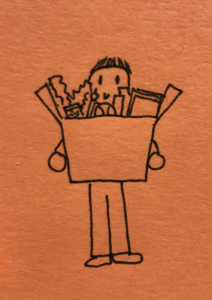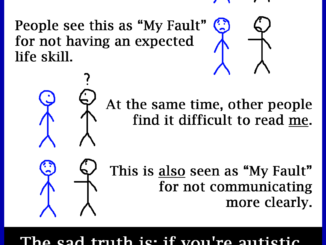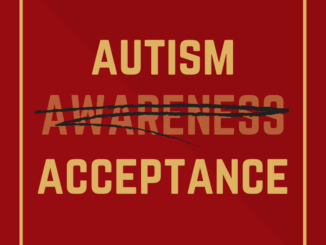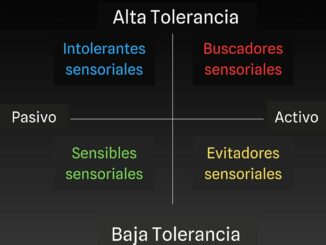I want you to imagine for a moment that…everything is really good right now.
Imagine that all the things on your to-do list that feel like “have to”s (instead of “get to”s) are taken care of. Someone is going to bring you dinner and it’s food you love and your body is hungry for it. Your finances are in a good place, bills are all taken care of and you have some left over. If you work, you’ve been given an unexpected paid holiday solely for being so amazing. If you have kids, they are hanging out with someone who they adore and who adores them, who will take care of them in a way you like and trust. And so on, and so forth: everything that would be big or scary is actually peaceful, and things are really good right now.
Think to yourself, what would you do with your day or week if you had a day or week like that? Maybe engage in a favorite hobby or decompress by watching shows, reading, listening to a favorite podcast. Maybe you’d take a lovely bath. Maybe you’d sleep for a lot of uninterrupted hours.
Okay, now imagine I show up on your doorstep after a few days of this rest period and I’m holding a basket of random things that appear to be mostly, like, cloth and glitter and there’s a frisbee in there, a puzzle sticking out, is that an old-timey video camera? And I put the box down on your porch and I’m like “hey! Your kids are still doing fabulous and everything is still going spectacularly smoothly. Here’s some stuff I cleaned out of my office. I want you to learn a new hobby,” and then I mysteriously vanish.

Okay, so you question that whole interaction for a few minutes before being like “well, they are pretty weird, I guess this tracks” and you take the box inside to look at it. There’s sewing stuff and knitting stuff, there’s baking stuff and cooking stuff, there’s a book of fun facts about that thing you loved when you were 6 but haven’t thought about in awhile, there’s sports equipment and stickers, and after a bit you think “hmm I’ve always meant to take some time to get into ____, I guess now I could give that a try?”
***
Okay. Now pause that imagination.
Now I want you to imagine that none of the first stuff happened at all. Life is just lifing the way that it normally does and actually it’s a little extra hectic. You or one of your kids or both is a little sick, it’s 5pm and no one is anywhere near having anything ready for dinner, and you just dropped your phone and hit it *exactly* the wrong way and shattered the screen.
There’s a knock on your door. You open it and it’s me. “Hey what’s up,” I say, while dropping off a basket of assorted randomness. “I want you to learn a new hobby,” and then I leave.
You’re probably left standing there like ?!??! “What on earth are they talking about?? I’m not going to learn a new hobby! I don’t even WANT to learn a new hobby! My brain isn’t even in a place for accepting something new right now! I’m just trying to stay afloat and this is NOT HELPING!!”
And if I came back and tried to argue with you, “I’m trying to make you HAPPIER. I’m trying to give you something to ENJOY,” you might (rightfully) be like, “well, this is not the way to do it!!!”
***
When neurodivergent children — especially Autistic children, but not *only* Autistic children — are deeply, intensely, passionate about something that they love, sometimes adults will try to restrict their access to the thing they love, or force them to try to talk about different things, or force them to play with different toys. They might require them to interact with [new thing] in order to “earn” being allowed to play with or talk about [favorite thing].
(Given the most magnanimous possible interpretation,) these adults might believe that what they are doing is increasing the child’s long-term well-being. Because maybe, if you could fast-forward twenty years, you would have given the child a new thing to enjoy — now they enjoy two things, instead of just one thing. Or eight things, instead of just one. Or whatever. Wouldn’t that increase the child’s net amount of joy?
As you might be able to guess from my two initial hypotheticals…as you might be able to empathise with…it doesn’t really work that way.
If a child’s brain is absolutely stressed, overwhelmed, drowning, it makes them cling *harder* to the one thing (or however many things) that they love. It makes them fixate on it harder and try to wring more of the joy out of it. It may work, or it may not work. Sometimes, especially if they are VERY stressed, it may actually not seem like they are enjoying it…instead it may seem like they are talking very very fast but it’s never enough, spending every waking second wanting to think about the thing but it’s never enough…
This can be a sign of stress, or even distress. But the solution to that stress/distress, just like in the hypothetical, is not to show up at their doorstep demanding they shortcut to the end product, “Love a new thing!”
The solution is to start the process of unwinding the complicated factors that have led them to the state of stress, first. So that they can have a brain that can even possibly consider, “could a new thing bring me new joy?” AND—after—they’ve had plenty of time to engage in their already-favourites in a non-stressed-out way!
Orrr…they might get to a state of less overwhelm and less drowning, and still just really really really love the thing it is that they love. That is okay, that is allowed, that is magnificent! The more time spent with that one thing they love, the more they will often find new ways to enjoy the thing they love, too — new angles to explore it from, new history to learn about it, new spinoffs to enjoy, etc, etc, etc. That is all okay and wonderful and healthy.
If it feels like your neurodivergent child’s special interest is SO intense that it’s unhealthy…it could be that that is, in fact, the case. But it’s not their interest that’s unhealthy, it is that their mental state is unhealthy, and the symptom of it is that their passion and delight is even being affected. Helping them get to a state of mental health first is the way to do it. You can’t get the end result by cutting off access to the one safety line they have left.



